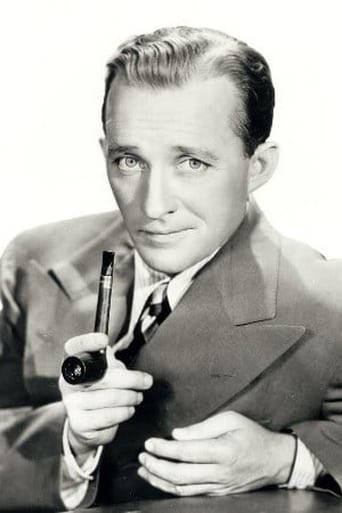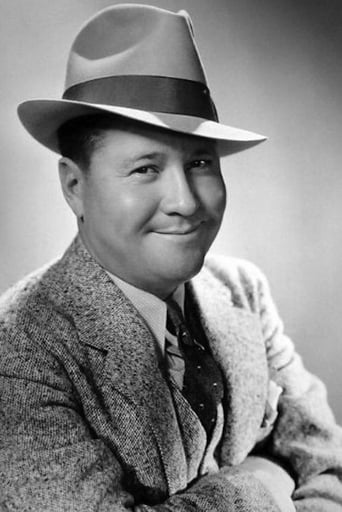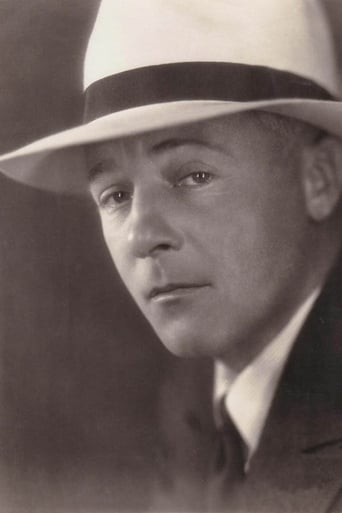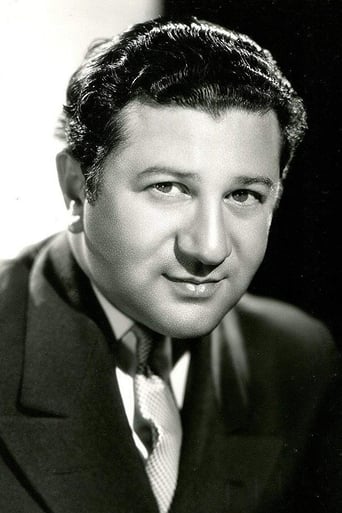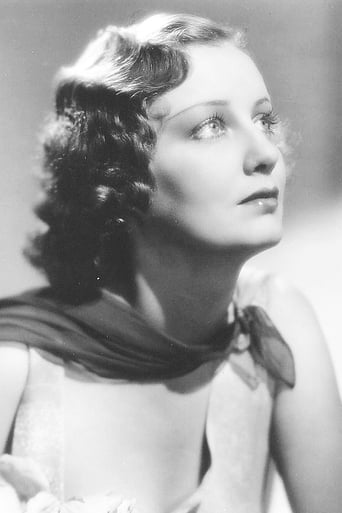mark.waltz
Sort of a reverse "Going Hollywood", this sassy musical comedy has Bing bringing stars of a rural country theater to New York to audition for his new Broadway musical. The presence of the sweet Judith Allen upsets Bing's nasty fiancée (Lilyan Tashman), especially since Allen obviously is more talented than her gin guzzled self is. Bing respects the fact that Allen is comic Jack Oakie's girlfriend, but the course of true love runs deep, leading to another hard boiled canary (Kitty Kelly) to step in to help. This leads to a lavish last reel, one of Crosby's few musicals to really have a lot of dancing, here choreographed by Leroy Prinz. If this show has any issue, it's too much of a good thing, from too many fried blondes, too many comics, and like the title says, too much rhythm. Funny man Oakie is joined by Skeets Gallagher, acerbic Ned Sparks and Harry Green as a nervous producer. 1933 was a great year for musicals with several all time classics coming from each studio, and every studio having more than one forgotten gem. Bing gets to spoof his image, with Allen obviously emulating Ruby Keeler to Crosby's Dick Powell, Tashman becoming Bebe Daniels and Kelly doing a perfect Joan Blondell. This stands up on its own, so it doesn't need to be labeled a rip-off with a very amusing screenplay and fun for all all around.
bkoganbing
This was Bing Crosby's third feature film on his new Paramount contract and by now Paramount discovered that they didn't have to put much production values into his films. Just give Bing some good songs to sing and the picture sells itself.That was definitely the case here. Crosby was supplied with a nice score by Arthur Johnston and Sam Coslow that contained two of his early film hits, Thanks and The Day You Came Along. For Crosby fans that's enough recommendation right there.However what makes the film sad is that this is a backstage story with enough opportunities to do some really nice production numbers. When you consider what Busby Berkeley was doing at Warner Brothers at the same time Paramount was making Too Much Harmony, this film comes off much the worse by comparison to any of Berkeley's work.They gave Bing a nice supporting cast with Jack Oakie, Skeets Gallagher, Ned Sparks and Harry Green. Bing is caught between two girls in this one Judith Allen and Lilyan Tashman. Lilyan is the bad girl and gold digger that she is, you kind of wonder why Bing is bothering with good girl Judith Allen.Judith Allen, I understand was the current inamorata of one of the Paramount studio bigwigs and he foisted her on this film. She's so bad she makes Ruby Keeler look talented. Her singing was as bad as Ruby and her acting was insipid. She didn't last long at Paramount, she was doing B westerns at Republic with Gene Autry by the end of the decade and dropped out of sight after that.My favorite number in this takes place in a train boxcar where Bing, Ms. Allen and the rest of the cast gradually join in as Bing kids his image by singing All the World is Singing Buh boo boo boo. It has that very impromptu look that a lot of Crosby's best movie numbers have. Too bad he didn't make a record of it.He did however make a record of another song from the film that he didn't sing in Too Much Harmony. An actress named Kiity Kelly does a lovely torch number called Black Moonlight. However Crosby did record it for Brunswick records like the other two numbers mentioned and it did enjoy a good sale considering this was Depression America. He always liked it and said so on his Musical Autobiography for Decca that came out a generation later. He said he hoped some of the newer generation of singers revived it. No one else has ever sang it to my knowledge.For Crosby fans this is a must, others take it for what its worth.
lugonian
TOO MUCH HARMONY (Paramount, 1933), directed by A. Edward Sutherland, is what the title indicates - lots of songs and short on plot. It features Bing Crosby in his third starring musical role for Paramount, following his success of THE BIG BROADCAST (1932) and COLLEGE HUMOR (1933), but TOO MUCH HARMONY is possibly Crosby's least known, discussed and most neglected movie from his early years at Paramount.In this outing, Crosby plays Eddie Bronson, a New York stage personality who has just finished performing in Max Merlin's (Harry Green) "Cocktails of 1932" singing the closing bars to the song "Learn to Croon" (which was introduced by Crosby in his previous musical, COLLEGE HUMOR). With the theatrical troupe leaving town for New York by train, Eddie is anxious to charter an airplane so that he could meet and be with his fiancée, Lucille Watkins (Lilyan Tashman), a gold digger, whom one showgirl asks, "Has she ever been on the level with anybody?" and the other responds, "No, that dame is just about as square as a grapefruit." On his way to his destination, the airplane is met with problems and makes a landing in a tiny Ohio town. While there, Eddie comes to a small movie house playing INTERNATIONAL HOUSE (Paramount, 1933) where he watches a vaudeville show prior to the movie headlined by the two aristocratics, Johnny Dixon and Benny Day (Richard "Skeets" Gallagher and Jack Oakie), and a featured singer named Ruth Brown (Judith Allen) loved by Benny. Knowing that Max needs a new leading lady for his upcoming show, Eddie decides to hire Ruth, but has no interest in taking along the comedy team of Dixon and Day. Because they are the ones who helped Ruth land her first break, she convinces Eddie in taking them along. As time passes, Ruth works long and hard to make an impression and future success, but almost decides to give it all up due to frustration. Knowing that the fortune hunting Lucille is all wrong for Eddie, the troupe talks Benny into getting rid of this gold-digger by posing as Charles W. Beaumont Jr., a rich Southern tycoon owner of a tobacco plantation in Virginia with "more money to shake a stick at but nobody to spend it on" so that Lucille will take an interest in him and break her engagement to Eddie. (Oakie with Southern accent, dressed like a Southern gentleman, giving confusing answers to questions make this a very humorous moment of screen deception) After this encounter, with Beaumont planning to go away with Lucille to Spain, Dixon asks Day, "Do they speak Yiddish in Spain?" Response by Dixon: "If they don't, it's the only place.").Good songs written by Sam Coslow and Arthur Johnston include: "Learn to Croon" (sung by Crosby and chorus); "Two Aristocrats" (song and performed in comic style by Skeets Gallagher and Jack Oakie); "The Day You Came Along" (sung by Judith Allen); "Boo-Boo-Boo" (sung on board the train by Crosby and passengers); "The Day You Came Along" (reprise by Crosby); "Thanks" (sung during rehearsals by Allen and Crosby); "Black Moonlight" (production number sung by Kitty Kelly, danced by chorus in Harlem setting); "Cradle Me With a Ha-Cha Lullaby" (sung and tap danced by Kelly); "Two Aristocrats" (reprise by Gallagher and Oakie); "Thanks" (sung by Allen and Crosby); "Buckin' the Wind" and "Thanks" (both sung by Crosby). Of all the production numbers, the one that stands out is the three minute finale, "Buckin' the Wind" which presents girls dressed in white struggling to walk and dance through heavy wind storms only to moments later have their BVDs lifted off and shown with a big sign reading "Censored" over their torsos. The orchestration to many of the songs echos that of 1920s music, but overall, good but sometimes loud to the ear. While another tune, "I Guess It Had to Be That Way" (as sung by Crosby) is sometimes credited as being one of the tunes recorded for the movie, it ended up on the cutting room floor. It's a nice song that can be heard in one of Crosby's old record recordings. Average choreography compliments of LeRoy Prinz.Also in the cast is the lovable grouch himself, Ned Sparks, as Lem Sporne, a sourpuss who despises show people ("Oh death, where is thy sting"); along with Evelyn Oakie, Jack's natural mother, in her only screen appearance, playing, who else, his mother, Mrs. Day. Oakie has a tender moment when he briefly sings her an Irish lullaby in the style of Irish singing legend, John McCormack. Oakie also has sentimental scene expressing his emotions towards Ruth while pacing over in the dark section of the stage. Then there's minor support by Grace Bradley, with Anna Demetrio and Henry Armetta as an Italian couple.TOO MUCH HARMONY is not as famous as several other backstage musicals of the 1933-34 period, and probably never will be, but this tuneful, occasionally amusing and fast-paced musical does deserve to be taken out of mothballs and rediscovered. (***)
